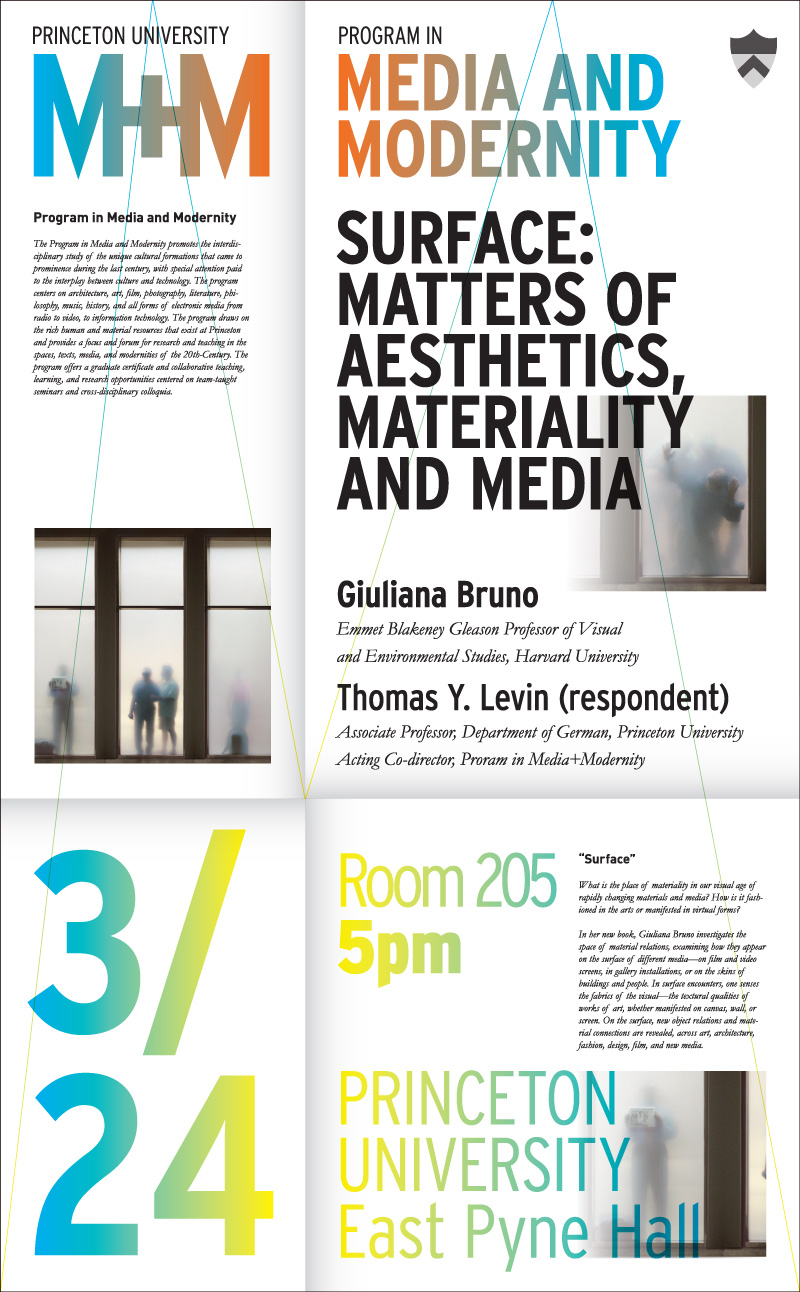TUESDAY, MARCH 24, 2015
East Pyne 205 (NEW LOCATION), 5:00pm
Giuliana Bruno (Harvard University)
Thomas Y. Levin (respondent, Princeton University)
Surface: Matters of Aesthetics, Materiality and Media
Professor Bruno will lecture on the subject of her new book, Surface: Matters of Aesthetics, Materiality, and Media (University of Chicago Press, 2014). What is the place of materiality in our visual age of rapidly changing materials and media? How is it fashioned in the arts or manifested in virtual forms? In her new book, Giuliana Bruno investigates the space of material relations, examining how they appear on the surface of different media—on film and video screens, in gallery installations, or on the skins of buildings and people. She engages the surface as a place of material contact between people and art objects. In surface encounters, one senses the fabrics of the visual—the textural qualities of works of art, whether manifested on canvas, wall, or screen. Bruno illuminates this modern surface condition at a time when façades are becoming virtual screens and the art of projection is reinvented on gallery walls. Showing how technologies of light produce new forms of materiality, she treats the screen surface as a site where different forms of mediation, memory, and transformation can take place. Surface addresses contemporary visual culture, revealing new object relations and material connections across art, architecture, fashion, design, film, and new media.

Giuliana Bruno is the Emmet Blakeney Gleason Professor of Visual and Environmental Studies at Harvard University. Professor Bruno is internationally known for her research on the intersections of the visual arts, architecture, film and media. Her new book is Surface: Matters of Aesthetics, Materiality,and Media, published by the University of Chicago Press in 2014. Her seminal book Atlas of Emotion: Journeys in Art, Architecture, and Film (Verso, 2002) won the 2004 Kraszna-Krausz Book Award in Culture and History – a prize awarded to "the world's best book on the moving image" – and has provided new directions for visual studies. Her recent book, Public Intimacy:Architecture and the Visual Arts, published by MIT Press in 2007, has been translated in Europe and Asia. For Streetwalkingon a Ruined Map (Princeton University Press, 1993), a journey through modernity and cultural memory, she won the Society for Cinema and Media studies annual award for best book in film studies. She writes frequently on architecture and art for international books such as Automatic Cities: The Architectural Imaginary in Contemporary Art (MCASD, 2009), Space (MAXXI Museum for 21st Century Arts, 2010), and Ruins (MIT Press, 2011). Her contributions to contemporary art monographs include Diana Thater (LACMA, forthcoming), Jane and Louise Wilson (2004), Chantal Akerman (MHKA, 2012), Jesper Just for the Venice Biennale 2013 (and MAC/VAL, 2012), and Isaac Julien for The Museum of Modern Art (2013). She is featured in Visual Culture Studies: Interviews with Key Thinkers as one of the most influential intellectual working today in visual studies (Sage, 2008).
Thomas Levin, an associate professor in the German Department (and associate faculty in the Dept. of Comparative Literature and the School of Architecture), teaches media and cultural history and theory. His essays have appeared in October, Parkett, Grey Room, New German Critique, Screen, The Yale Journal of Criticism, Musical Quarterly, ARCH+, Cahiers du MNAM, and Texte zur Kunst Levin has translated and/or edited three books on the work of the cultural critic and film theorist Siegfried Kracauer, including The Mass Ornament: Weimar Essays (Harvard UP, 1995). As a curator, he was part of the collective that mounted the first exhibition on the Situationist International at the Centre Pompidou, ICA London and the ICA Boston in 1989. Levin also conceived and curated the exhibition CTRL [SPACE]: Rhetorics of Surveillance from Bentham to Big Brother at the ZKM (Center for Art and Media Technology) in Karlsruhe in October 2001. More recently he co-edited a volume of Walter Benjamin’s media theoretical writings entitled The Work of Art in the Age of its technological Reproducibility and other Writings on Media (Harvard University Press, 2008). Levin is currently working on a large-scale project on the media-archaeology of voice mail.
